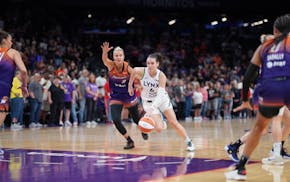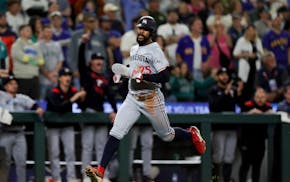Kirk Cousins threw more passes this season than any other in his 11-year NFL career, Justin Jefferson solidified himself as a megawatt superstar and the Vikings became the ninth team in league history to have four receivers reach 60 receptions.
By now, the team's offensive identity is abundantly clear.
The running game has taken a back seat as the Vikings rank near the bottom of the NFL in rushing production and rushing attempts. The ground game hasn't been a focal point of Kevin O'Connell's first season as head coach and play-caller.
The question now: Does the formula matter, or will the offense need more from Dalvin Cook and the running game to have an extended stay in the playoffs?
"I feel like we can be as productive as we want to be," Cook said. "We just have to go out there with the mind-set to go do it."
Football coaches have hammered into our noggins since the beginning of time that a trusty running game is vital to success, especially late in the season and postseason.
Gotta be able to run the ball.
A punishing running game does allow a team to control the clock and impose its will on the opponent. Few things are more demoralizing on a football field than a defense that is unable to stop the run.
Vikings rushers produced sporadic highlights this season, but the overall statistics reflect a different template. But that's not a death knell in the playoffs in modern football.
Consider rushing rankings of the four conference finalists over the past 15 seasons. Of those 60 teams, only 29 finished in the Top 10 in rushing that season. Six teams ranked 28th or lower, including two that finished dead last.
So, no, an average or worse running game is not automatically a roadblock in the postseason.
One word — efficiency — is how O'Connell assesses whether his run game is hitting the right mark.
"The explosives are great," he said, "but what I look for as the play-caller is, 'Can we stay on schedule?' Can we churn out 3, 4, 5 yards per run and stay on schedule without the negatives, without the minus 2 here and the minus 4 and the penalty or holding call here or there?"
That unevenness in the running game made it a disjointed season.
Cook crossed the 1,000-yard threshold again, finishing sixth in the NFL in rushing yards at 1,173. And he contributed a few "wow" moments in a season filled with tense, dramatic finishes. His 53-yard touchdown run late in the fourth quarter at Miami sealed the win. His 81-yard touchdown run at Buffalo provided a spark of hope. His 64-yard touchdown on a screen pass allowed the Vikings to catch the Colts in their historic comeback.
On the flip side, nearly one-quarter of Cook's 264 carries this season have resulted in no gain or lost yardage, putting the offense in unfavorable situations.
"Those set you back and completely can derail drives," O'Connell said. "You're trying to get back on track from there."
O'Connell said he feels "really strongly" about Cook and backup Alexander Mattison, but the Vikings now face a win-or-else edict with a retooled offensive line after being hit by injuries.
Sunday's playoff opener might be the right time to establish balance. The Giants own one of the league's worst run defenses, ranking 27th in yards allowed and 31st in yards allowed per carry.
Cook hasn't reached 100 yards in eight consecutive games. Defenses have smothered him, eliminated explosive runs. The Vikings are harder to defend when he's rolling, and this would be a good time to recapture that, even as O'Connell's scheme wisely revolves around Cousins and the exceptional Jefferson.
"I'm hyped," Cook said Wednesday. "I'm ready to go. It's playoff football, man."
He sounded like a guy ready for the moment. The Vikings have proven they can win with a strong passing game and sputtering running game, but being able to count on both is optimal.

Twins rally against Mariners with three last-chance runs and a bunch more in the 10th

Playing without their star, Lynx keep things perfect with comeback at Phoenix

Buxton returns to top of Twins lineup and to his post in center field

